Business overview
In order to contribute to the development of higher education, we are exchanging information on the initiatives and research results of each university consortium.
Event Outline
- theme
- The role of universities and new developments in university consortia
University consortia in the era of community formation and regional revitalization - schedule
- Saturday, September 12, 2015 13:00-20:00 (Poster session 12:00-18:00)
Sunday, September 13, 2015 9:30-11:30 - venue
- Kanazawa Institute of Technology Ogigaoka Campus
- Co-organized by
- National University Consortium Council
General Incorporated Association University Consortium Ishikawa - Content
- The 12th National University Consortium Research Exchange Forum Leaflet [Click here for details]
Keynote speech: “Regional revitalization and the role of universities”
Hiroya Masuda (Visiting Professor, Graduate School of Public Policy, The University of Tokyo)
Symposium: “The role expected of universities and new developments in university consortia
University consortia in the era of community formation and regional revitalization”
Yukiyoshi Yamano (Mayor of Kanazawa City)
Mitsunori Imai (President, Setsunan University)
Kiichiro Tomino (Representative Director, General Incorporated Association, Northern Kyoto Prefecture Regional-University Collaboration Organization) Yujiro Hayashi
(Auditor, Japan Advanced Institute of Science and Technology)
Masayoshi Shibata (Vice President, Executive Director (Education), Kanazawa University) - Purpose of the event
-
Humans form societies in which they live in groups while coexisting with nature, and foster public life and culture. Intellectual curiosity and the desire to create things have stylized the application of scientific knowledge to technology, and the important mission of higher education at universities and other institutions is to promote such science and technology and to develop human resources. However, humanity is now facing various problems in both the natural and social environments, as well as problems associated with globalization. Domestically, there is a declining birthrate and aging population, population decline, and companies are moving overseas, and the marginal issues of local areas due to widening regional disparities are serious.
In this situation, Japan is urgently innovating science and technology for sustainable development, cultivating talented human resources, and revitalizing local communities while responding to the challenges facing humanity and the nation. Although the missions of education to cultivate human resources, research to create knowledge, and social contribution at universities are unchanging, the cultivation of global human resources, the pursuit of sustainability in research, and regional bases such as COCs and COIs are the trend of the times.
The trend of corporatization of national, public and private universities, which began in 2004, has confirmed the reason for their existence by promoting competition and cooperation, and is responding to the “university for society”. University consortia are part of this cooperation, but as the nature of universities changes dramatically, new developments are also required for consortia.
One of the major points of this transformation will be for universities to play a certain role in community formation through collaborative education with the local community. In Japan, where the declining birthrate and aging population and local depopulation are progressing dramatically, one of the effective measures to prevent the collapse of local communities and stop the outflow of young people is, of course, for higher education institutions, mainly universities, to “stand firm” in the local area. This is why we have included “community formation” and “regional revitalization” in the subtitles this time.
At this National University Consortium Research Exchange Forum, which will be held again in Hokuriku after many times, we would like to explore with you a path that will lead to new developments in university consortia.
<Day 1>
| time | Content |
| 13:00~13:20 | greeting |
| 13:20~14:20 | keynote speech |
| 15:30~18:00 | Symposium |
| 18:00~18:15 | Venue transfer and information exchange meeting reception |
| 18:15~20:00 | Information exchange meeting |
| Poster session: 12:00-18:00 |
<Day 2>
| time | Content |
| 9:30~11:30 | Subcommittees (1st to 6th subcommittees) |
Implementation Report
The 12th National University Consortium Research Exchange Forum was held over two days, from Saturday, September 12th to Sunday, September 13th, at Kanazawa Institute of Technology (Nonoichi City, Ishikawa Prefecture), with the main theme of “The Role Expected of Universities and New Developments in University Consortia.”
As the very nature of universities is undergoing major changes and new developments are being called for from university consortia, 310 people from higher education institutions, government agencies, and other organizations from across the country participated in the seminar to consider ways to lead to new developments for the consortium, focusing on the role that universities play in forming communities through collaborative education with local communities, and the regional revitalization activities of higher education institutions to prevent the collapse of local communities.
For the keynote speech on the first day, we welcomed Hiroya Masuda, visiting professor at the Graduate School of Public Policy, University of Tokyo, to speak on the theme of “Regional revitalization and the role of universities.” He spoke from various perspectives about how universities, which play a major role in local communities, should promote regional revitalization in the future.
- ▽Keynote speaker: Hiroya Masuda
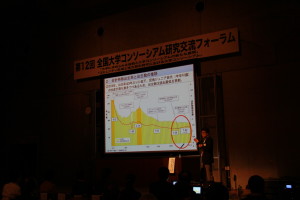
- ▽Keynote speech
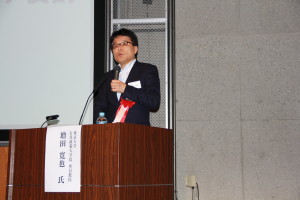
The symposium also featured four topics from the perspectives of government, university faculty, and the Community-University Collaboration Organization: “Regional revitalization and the role of the local community,” “The role of universities in regional collaboration,” “Promotion of the University Joint Education Promotion Project in Kyoto and its future development,” and “Community-based society and universities.” A lively discussion ensued afterwards.
The poster session held at the same time was a great success, with many questions and comments from participants about the efforts of each consortium organization, and active interaction between exhibitors and participants was observed.
- ▽Symposium discussion
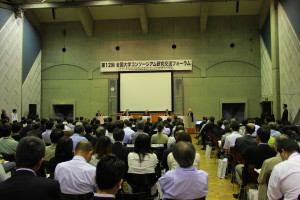
- ▽ Poster Session (21 exhibitors)
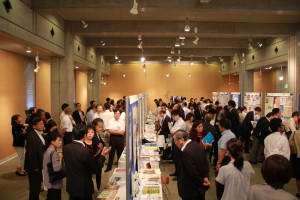
On the second day, six subcommittees were held covering various themes related to universities and consortia, such as “Fostering human resources who will be responsible for regional revitalization and regional services” and “Toward creating an environment for accepting international students in collaboration with local governments and regions.” Practical case studies were reported and participants exchanged opinions.
- ▽ Workshops (6 subcommittees in total)
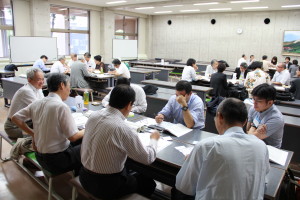
- ▽Case report
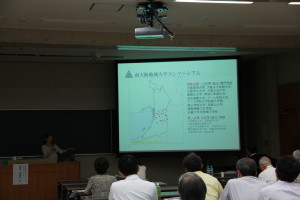
The next, 13th forum is scheduled to be held in Hiroshima in September 2016. Details will be posted on the University Consortium Kyoto website as soon as they are finalized.
We hope you will consider attending.
“The 12th National University Consortium Research Exchange Forum” [Leaflet available here]
















